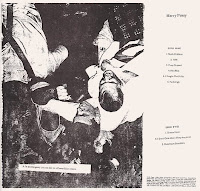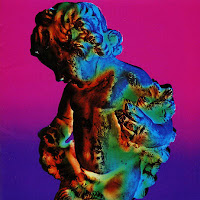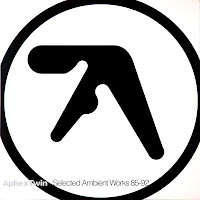So I listened to a rip someone blogged of the 1993 Harry Pussy 12" 'In An Emergency You Can Shit On A Puerto Rican Whore' (well, writing that will flush out whether my parents are still reading this). Listening to eight of these nine tracks feel like flossing your ears with barbed wire – it's chaotic, messy with over-distorted guitars bludgeoning all else into submission; words can be heard but not deciphered; frantic not-quite-riffs dominate. Then there's the final track; in anyone else's mitts the unlikely punk-fuzz cover of Kraftwerk's 'Showroom Dummies' would sound nightmarish, but compared to the other tracks it sounds positively gentle. In the lyrics to 'Showroom Dummies', the plastic models in the shop window come alive and break the glass in order to escape; Harry Pussy's version is the sound of them grinding the glass under their feet as they step onto the pavement, leaving shards and deep scratches embedded in their plastic feet.

Duly reset, 'In An Emergency...' was followed up with a CD I bought in Falmouth's excellent Jam by Loren Connors (formerly Loren Mazzacane Connors) and Jim O'Rourke. Two Nice Catholic Boys captures duo performances by the two guitarists from European dates in 1997, and consists of three vaguely-monikered tracks ('Paris', 'Or Maybe Koln', 'Definitely Not Koln'). Connors and O'Rourke are titans of the experimental music field (both composed and improvised) and the interplay between them here is quite special. Judicious use of feedback and reverb prevents this from becoming some sort of axe-wielding standoff, and there are brief flashes of staccato rhythm. This was released on the excellent Family Vineyard label from New York. Somewhere in a record box I have a solo guitar album by sometime contributor to The Wire magazine Alan Licht (YMCA), also released on the label; one for another week.

Sticking with the distorted guitar / noise theme, Lou Reed's Metal Machine Trio (or MM3) released a double CD of live dates in LA two years ago and I totally missed it. The trio is intended to draw out the 'spirit' of Reed's Metal Machine Music, released in 1975. Metal Machine Music is a love-it-or-hate-it album consisting of electronically-processed guitar and synth and is mostly ear-shredding noise of the extremest order. At the time of its release Reed was quoted as saying that it was recorded to honour a final album contract obligation.

Since then its reputation has grown among the experimental music fraternity, during which renaissance Reed appears to have changed his stance, claiming it was a calculated piece of sonic artistry all along. He has subsequently performed the piece with Berlin chamber orchestra Zeitkratzer, and MM3 is an extension of the relatively free jazz / improvised atmosphere the original Metal Machine Music evokes. The Creation Of The Universe, despite its slightly over-confident title, is subtle improvisation, mostly; occasional brooding distorted guitar rises up menacingly from the more low-key sections, often heralding passages of fuzzy noise and skronking sounds reminiscent of James Chance from Ulrich Krieger (who also forms part of the Text Of Light trio with Alan Licht and Sonic Youth's Lee Ranaldo). There are chord changes in some sections that had me scratching my head wondering where I recognised them from and then I sussed it – they're the same as final section of The Velvet Underground's 'I'm Sticking With You'. The third member of this free rock trio is Seth Calhoun, billed as providing 'live processing and continuum fingerboard'. Nice.
Others: Sleigh Bells 'Infinity Guitars' (big distorted beats and loud , stuttering, guitar interruptions with shouty female vocals; me like); Screaming Females 'I Don't Mind It' (New Jersey trio do girl-fronted melodic Buzzcocks-esque punk - only marred by needless riffing at the end); The Silver Pesos 'Regresando' (free single from this LA band – dreamy ambient electro-pop with latin flourishes, plus an excellent Youth-esque remix); Best Coast 'Boyfriend' (hazy, Spector-esque boy-girl duo pop; beguiling); Anamanaguchi 'Airbrushed' (zany Yo-Gabba-Gabba-style synth goofiness from New York).









